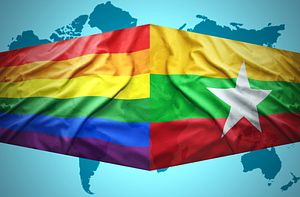This has been a monumental year for the quotidian struggle for greater LGBT rights in Myanmar. International attention was drawn to Myanmar’s LGBT community when Myo Min Htet and Tin Ko Ko held an unofficial wedding ceremony in Yangon, celebrating their relationship in front of friends and family. As a result, conservatives throughout the country called for the strict enforcement of Section 377 of the penal code, a law punishing “carnal” same-sex relations with lengthy jail sentences, reinforcing the scathing divide over old and new Myanmar. Reform of the current, military inspired constitution could facilitate the end of such extreme responses by fostering greater inclusion in Myanmar’s fractured society, since LGBT issues cross all racial, religious, and ethnic lines. As discussion of constitutional reform continues, addressing how the LGBT community would benefit has become timely.
Myanmar’s first same-sex wedding ceremony was a huge victory for the country’s LGBT community, considering the climate of harassment and oppression of marginalized groups under the former military junta. Under the Tatmadaw, Myanmar lacked credible discussions about human rights or sexuality and gender identity. According to Hla Myat Tun, Program Director at the Yangon-based LGBT outreach center Colors Rainbow, most people in Myanmar still do not understand the difference between gender and sexuality, which adds to the confusion about the real issues surrounding sexual orientation and gender identity/expression in the country. Moreover, Hla Myat asserts that there is no dialogue about “sex” in Myanmar, and ideas about homosexuality are viewed through a lens of “foreignness.”
However, acceptance of the gay community is starting to manifest itself. With the nascent reform process in motion, the gay community has the potential for inclusion if the constitution is reformed. Parliamentarians are slowly accepting the call to promote LGBT acceptance, though mostly with recently elected female MPs. Most notably, Aung San Suu Kyi rallied for the removal of the archaic Section 377 through constitutional reform as a way to increase HIV/AIDS treatment for marginalized groups. Without access to safe-sex resources like condoms for at-risk groups, HIV/AIDS rates continue to remain difficult to manage. The greatest challenge though, involves gaining recognition from the former junta officials, largely because they occupy the seats needed to amend the constitution. Accordingly, there is little minority groups can do to press for change.
Moreover, there exists in Myanmar a strong stigmatization associated with being a homosexual man, and even more so for a homosexual man with HIV/AIDS. Without greater access to resources and without acceptance of their lifestyles, at-risk gay men continue to engage in high-risk unprotected sex. Even more, without a strong push for acceptance in Myanmar, closeted men continue to live double lives, putting themselves and their spouses at risk of infection. Such closeted gay men meet in dark, secluded places with other closeted gay men. They are often caught by the police and psychologically abused and shamed for their actions. Detained individuals are stopped for violating section 35(C) of Myanmar’s Police Act, which allows the police to stop anyone suspiciously lurking at night. Institutionally, the LGBT community has few options for addressing violent persecution since the police are responsible for a large part of the violence. If carried out, constitutional change could improve the rule of law and safeguard LGBT individuals and other minority groups. Though the police are not solely responsible for the ill treatment of the LGBT community, greater police regulation could help eradicate the climate of fear the government has created.
Constitutional reform also has a role in reforming education, since currently there is no such thing as sex education in Myanmar. School-aged children are not taught about contraceptives like condoms or birth control, and access to contraceptives is equally limited. Additionally, Burmese schools do not teach about human rights issues. Basic human freedoms are not discussed, and so with generations of graduates unaware of what human rights are, there cannot be fruitful discussion about where Myanmar stands on issues of human security. Without education concerning safe sex and human rights, the cycle continues to be problematic.
The reality is that progress for Myanmar’s LGBT population is being made, albeit slowly. Constitutional reform carries a chance for greater inclusion, but it requires a significant commitment from the Burmese political elite. Much like the debate over ethnic and religious minority groups, improving education should be at the forefront of Myanmar’s LGBT movement, and this starts with a genuine obligation of the government to improve the lives of the people it governs.
Matthew McFetridge is a Master’s candidate in Southeast Asian Studies at the School of Oriental and African Studies, University of London.

































